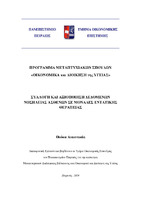Συλλογή και αξιοποίηση δεδομένων νοσηλείας ασθενών σε μονάδες εντατικής θεραπείας
Collection and utilization of patient care data in intensive care units

View/
Keywords
Μονάδα Εντατικής Θεραπείας (Μ.Ε.Θ.) ; Δεδομένα ασθενών ; Κλινικά πληροφοριακά συστήματα ; Εφαρμογές ; ΛογισμικάAbstract
This paper intends to study the issue of the utilization of the data that are being produced during patients’ hospitalization Intensive Care Units (I.C.U.). This excessive need to make good use of these produced data lies in the fact that in this specific department of the hospital a huge amount of information is being continuously gathered due to the constant monitoring and recording of the vital signs, as well as other parameters related to the patients. In many instances, although these data are significantly useful in clinical decision making and therefore contribute not only to the improvement of the provided care, but also the patients’ outcomes in the I.C.U., they are not further being proceed and consequently it is difficult to use them. Due to the ongoing development of technology and the usage of computers and other technological means, it is now more than ever possible to digitize the produced data, in order to make use of them in clinical practice, but also for research purposes in the distant future.
In this thesis, and more specifically in the first two chapters, the tremendous amount of the patients’ data that are being produced during their staying in the I.C.U. is being pointed out. Subsequently, the substantial significance and the necessity of further utilization of the aforementioned data is being highlighted, so as to improve the quality of the provided care to seriously ill patients. Afterwords, there is a presentation of the available information systems, software and applications, that can be found in Greece and abroad, which are specialized and suitable for use in I.C.U. so as to make the produced data to be used in an optimal way.
Then, in the third chapter a study conducted in a large Hospital in Athens is presented, considering that in this way a representative image of the conditions that are in effect in the rest of the Hospitals in Greece is provided. In particular, an extensive record of the staff, beds and medical equipment available in this Hospital’s I.C.U. is made, as well as the problems that arise due to various deficiencies, such as for example deficiencies in human and financial resources, as well as issues related to information infrastructure. Subsequently, there is a presentation of the results obtained through a distribution of a questionnaire, which captures the knowledge and perceptions of the medical and nursing staff towards a potential installation of suitable and specialized information systems, software or even applications for use in ICUs, in order to make better use of the data generated in this department of the Hospital. The said questionnaire has been answered by a total of 50 doctors and nurses employed in the ICUs of Hospital that is under study.
In the end, there is a review of the conclusions of this dissertation, taking into account the data obtained from the study carried out in a large Hospital of Athens. In particular, it was found that there is a great need of organization in terms of the information infrastructure in the ICU, as the stuff comes up against numerous problems, while at the same time most data records are manuscripts and as a consequence it is extremely difficult for the stuff to process them and be able, by extension, to use them later for research purposes, with a view to improve the provided health care and enhance the patients’ outcomes. Furthermore, it was observed that the professional status is related to the attitude of the staff apropos the use of an integrated information system in the ICU and more specifically that doctors are more amenable to it than nurses. Subsequently, through a statistical analysis of the data, it was found that the less experienced doctors and nurses have probably more positive attitude in regard to the use of an integrated information system and the appropriate training for this purpose, than the more experienced ones, whereas, at the same time, the doctors and nurses that have been working in this specific Hospital for more than 10 years have possibly more negative attitude in regard to the use of an integrated information system and the appropriate training for this purpose than those with less years of work in the same Hospital. Finally, there is a presentation of suggestions and solutions that could potentially, being adapted to the Greek reality, contribute to the issue of the utilization of the data that are being produced in ICUs, which is as mentioned above, of great interest.


